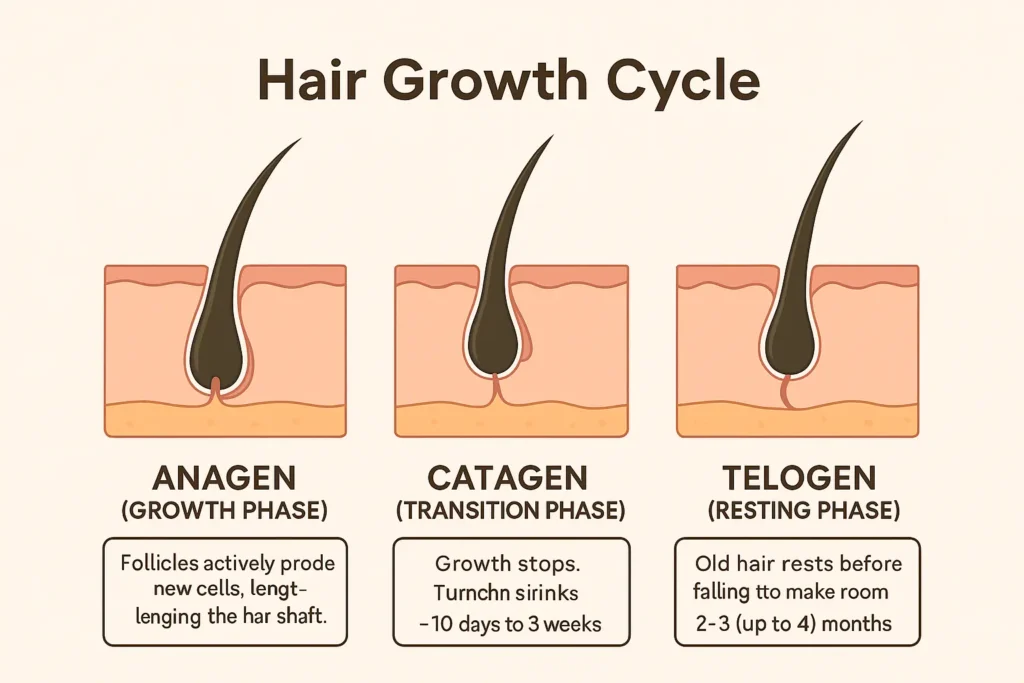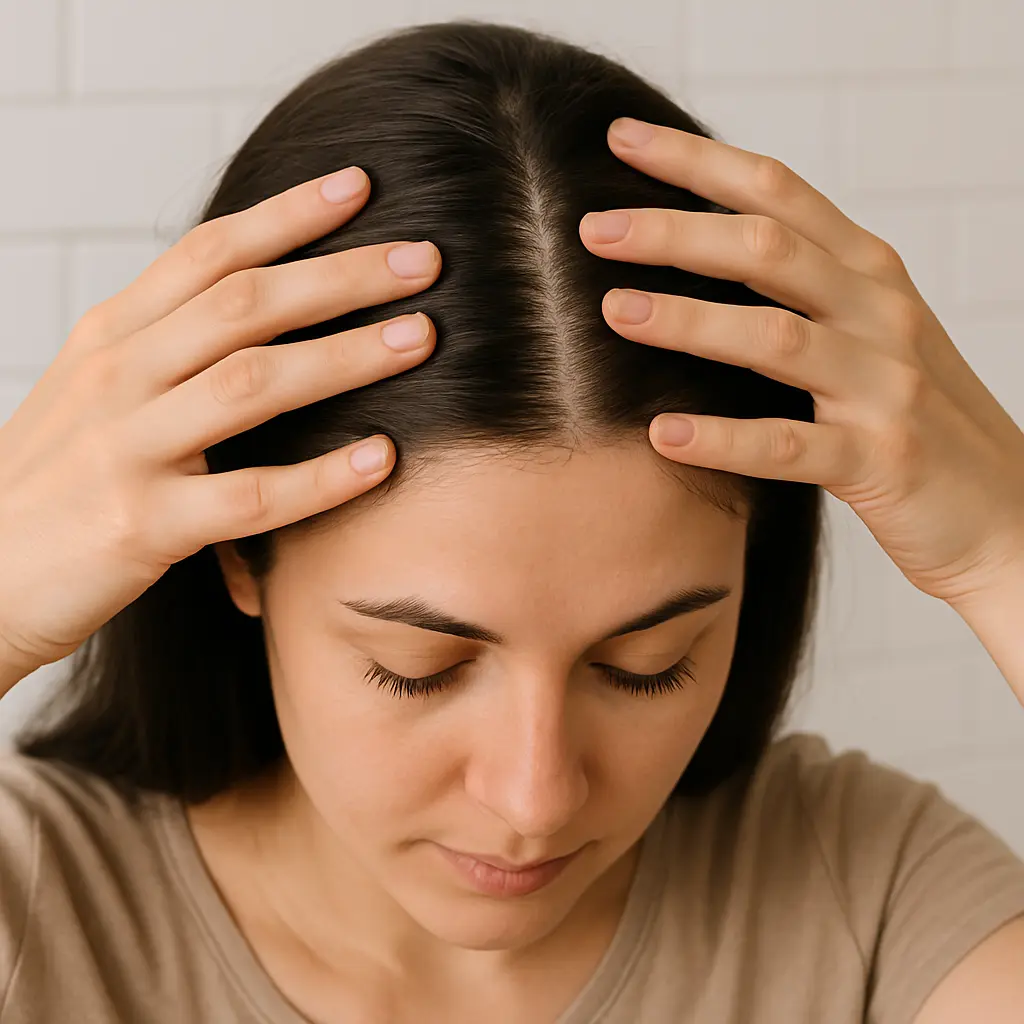It’s a scenario many of us know all too well: you’ve been taking good care of your hair, trimming regularly, using quality products, and avoiding heat damage. Yet when you compare old photos, your hair length looks exactly the same.
This frustrating plateau often leads people to wonder if their hair has simply “stopped” growing. In reality, hair is always in a cycle of growth, rest, and shedding — but when the growth phase is shortened or breakage occurs, it can feel like nothing is happening.
While genetics set the foundation for your growth rate, there’s much more you can control. Factors like scalp health, nutrient intake, stress levels, and even how you treat your hair at night can significantly impact visible growth.
This guide goes far beyond the common “7 reasons why your hair grows slowly” lists. Instead, we’ll focus on science-backed, actionable strategies you can start today. We’ll also cover little-known factors, practical routines, and the latest at-home tools — all designed to help you overcome slow growing hair and achieve your length goals.
Table of contents
Understanding the Science Behind Hair Growth
Before you can speed up hair growth, it helps to understand how it works. Hair growth happens in three mai
| Stage | Duration | What Happens |
|---|---|---|
| Anagen (Growth) | 2–6 years (up to 8 years) | Hair actively grows from the follicle; the longer this phase, the longer your hair can get. |
| Catagen (Transition) | 10 days to 3 weeks | Growth stops; the follicle shrinks and detaches from the blood supply. |
| Telogen (Resting/Shedding) | 2–3 months (up to 4 months) | Old hair rests while new hair begins growing underneath. |
People with slow growing hair often have a shortened Anagen phase or increased breakage that masks actual growth.

Hidden Factors That Slow Growth
Some reasons for slow hair growth are obvious — like heat damage or chemical treatments. But others are less talked about:
- Thyroid issues: Both hypo- and hyperthyroidism can slow growth and cause thinning.
- Iron deficiency: Even mild anemia can weaken follicles.
- Stress and cortisol spikes: Chronic stress shortens the anagen phase.
- Lack of sleep: Growth and repair hormones peak at night. Poor sleep disrupts this process.
- Tight hairstyles: Constant tension can cause traction alopecia over time.
Slow Growing Hair? Here’s How to Speed It Up
1. Stimulate the Roots with Scalp Massage
Your hair’s growth begins at the root, and like any living tissue, it needs oxygen and nutrients to thrive. A daily scalp massage can:
- Improve blood circulation
- Deliver more nutrients to the follicles
- Encourage dormant follicles to wake up
How to try it:
- Use gentle, circular motions with your fingertips for 5 minutes each day.
- Warm a small amount of black castor oil, rosemary oil or jojoba oil before massaging for extra nourishment.
- Consider a scalp massager tool for consistency and ease.
Read more: Best Hair Oils: Top 10 Oils to Transform Your Hair

2. Adopt a Weekly Capillary Schedule
A “capillary schedule” is a structured hair care routine that balances three pillars:
- Hydration – Keeps strands soft and flexible
- Nutrition – Strengthens the hair shaft from within
- Reconstruction – Repairs damage to reduce breakage
Sample weekly plan:
- Day 1: Hydrating mask with aloe vera and glycerin
- Day 3: Nutritional mask with avocado and honey
- Day 6: Reconstructive treatment with hydrolyzed keratin
By cycling these treatments, you maintain optimal conditions for faster growth.
3. Feed Slow Growing Hair from Within
Strong, fast-growing hair is built on a foundation of good nutrition.
Key nutrients:
- Zinc: Pumpkin seeds, cashews, chickpeas
- Biotin: Eggs, almonds, sweet potatoes
- Iron: Spinach, lentils, red meat
- Omega-3: Salmon, walnuts, chia seeds
💡 Pro tip: Track your meals for a week to see if you’re getting enough of these nutrients. If not, add them into your diet before considering supplements.
4. Try At-Home Growth Tools
Technology can help speed up the process — even without salon visits.
- Microneedling rollers: Stimulate the scalp and boost serum absorption
- Laser caps (LLLT): Use low-level light to reactivate follicles
- Caffeine serums: May prolong the hair’s growth phase
Always follow product instructions carefully to avoid irritation.
5. Best Nighttime Habits for Slow Growing Hair
Your pillowcase can make a surprising difference.
- Use silk or satin pillowcases to reduce friction
- Loosely braid hair or wrap it in a silk scarf before bed
- Avoid tight hairstyles that stress the roots

6. Wash Less, Nourish More
Overwashing can strip away natural oils, leaving hair fragile.
- Limit shampooing to 2–3 times per week
- Choose sulfate-free formulas
- Use a gentle scalp scrub once a month to remove buildup
7. Build a Growth Routine and Stick to It
Consistency is key. Your daily and weekly habits — even the small ones — add up.
- Daily scalp massage (5 min)
- Weekly capillary schedule treatments
- Nutrient-rich diet and hydration
- Use of growth-stimulating tools (2–3 times per week)
- Protective nighttime routine
Print it, keep it by your vanity, and track your progress over 3–6 months.
Final Thoughts
Slow growing hair isn’t a life sentence — it’s a challenge you can tackle with patience and the right approach. By combining targeted care, proper nutrition, and innovative tools, you create the perfect conditions for your hair to grow stronger and healthier.
Stay consistent, track your progress, and remember: sometimes the biggest changes happen quietly, strand by strand.
Save this guide or share it with a friend who’s growing their hair — your journey is easier when you have the right plan.
Frequently Asked Questions (FAQ) for Slow Growing Hair: Proven Ways to Boost Growth
1.My hair has been the same length for months — what’s the first thing I should do?
Start with a scalp health check. Massage daily for 5 minutes, switch to a gentle sulfate-free shampoo, and add one zinc-rich food to your diet every day. Most people notice small changes within 8–12 weeks.
2. Is there a way to speed up hair growth after a haircut?
Yes — focus on stimulating the roots with regular scalp massages and nourishing treatments. Pair this with a high-protein diet and avoid excessive heat styling to preserve new growth.
3. How can I tell if my slow growth is a health issue?
If your hair is also thinning, shedding more than usual, or you notice changes in your skin, nails, or energy levels, see a doctor. Issues like iron deficiency or thyroid problems can affect growth.
4. Are supplements worth trying?
They can help if you have a confirmed deficiency. Always get a blood test first — over-supplementing certain vitamins (like biotin) can cause side effects.
5. What foods help with slow growing hair?
Eggs, spinach, salmon, pumpkin seeds, almonds, and sweet potatoes provide key nutrients for growth.
🔗 Also Read:
Why is My Hair Not Growing? 7 reasons for slow hair growing
Why is My Hair Not Growing? 7 reasons for slow hair growing
Why Does My Hair Get Greasy Fast? Essential Tips and Solutions
For more expert-backed insights on slow growing hair, its causes, and proven growth strategies, you can explore trusted beauty and health resources like American Academy of Dermatology, Healthline, Byrdie, and Allure.



